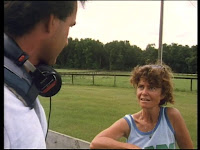 |
| 'Aileen: the selling of a serial killer' |
Aileen: The selling of a serial Killer was the documentary film we concentrated on within the lecture. The 1993 documentary is directed by Nick Broomfield and takes a very participatory mode of documentary, with Nick being extremely involved in his own documentary, it becomes almost about him and his relationship with Aileen. Other Participatory directors include Michael Moore with 'Bowling for Columbine' and 'Supersize me', where he personally goes out to investigate and the documentary effects his life personally.
''What happens because of the filmmakers presence becomes crucial as anything that happens despite his presence.'' - Bill Nichols (2001, P.101)
 |
| 'the life and death of a serial killer' |
Nick Broomfield asks 'stupid questions' to his interviewees to open up a bigger story and how and why they have/had a relationship with Aileen. In the second follow-up film of Aileen 'The life and death of a serial killer' (2003), we even see Nick being interviewed in court as part of her case. What i find fascinating about the first documentary on Aileen is how the documentary gives the viewer an argument on weather to agree and believe Aileen or not to. we are not told what to think and can change our views on what we've heard about her from the media. Once i watched this, part of me felt sorry for her as we followed her and her self defence stories were believable. Also i felt this sorrow as people were knowing her just for media attention and money. For example, she went on to Nick about the police making deals with movie companies and the media making accusations about her. Worse however, was the couple that adopted her as their daughter after she went into prison and who were making money from media, asking Nick for quite a large sum for an interview.
 |
| Nick with Aileen's 'adopted mum' |
 |
| Nick and Aileen |
By the end of the second documentary, we see Nick shouting his apologies at Aileen after she walks off unhappy with Nicks questions. You can see how generally upset he is at thinking he has hurt her feelings, showing just how much of himself he has put into Aileen and her story.
 |
| Monster - the film made on Aileen's life |
Other modes of Documentary!
Poetic - I find the poetic mode to portray a message more visually and metaphorically. For example, show London as a busy place i might show a time lapse of traffic, quick cuts, tubes racing by, a clock ticking away ect. It's a challenging and creative mode.
Expository - This mode is to educate and inform which we see a lot of on our TV's. Such as BBC2's 'The battle of Malta', which simply gives the audience an insight into the history of Malta and their help within the war, along with interviews of those who were there in this time period.
Observational - This mode usually is a fly on the wall type of documentary, where we simply follow a person or subject around. This is my favourite mode of documentary with examples such as 'The Family' and all David Attenborough programmes such as 'Africa' and 'Life'. I enjoy the insight into other lives and situations we may never experience or even know of without television.
Reflexive - showing the full development process of the film and establishing the crew and cameras such as in 'Catfish' where we begin with a different narrative following the man about and seeing what paintings he is being sent and his love life developing until the crew along with him discover somethings not right and take it up on themselves to go find this family. Another example is at the end of David Attenborough's nature programmes as we see how the crew have managed to film this and what issues they come across ect.
Performative - This mode would count for 'Man on a wire' as we follow his story through his interviews and see archive footage of the events and reenactments.
Nichols,B. (2001) 'Modes of Documentary'. P.101
No comments:
Post a Comment